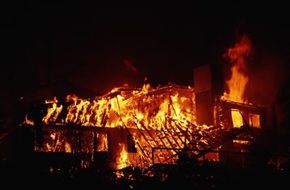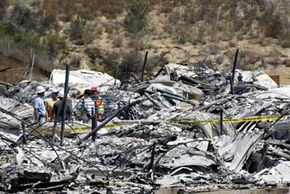Seattle's Street of Dreams is now a street of nightmares. The collection of multimillion dollar luxury homes was recently burned to the ground by people claiming to be eco-terrorists. Eco-terror, to paraphrase the FBI, is defined as the use of violence against victims or property by an environmentally oriented group for environmental-political reasons. The FBI considers environmental terrorism to be the number-one domestic terror threat facing the United States [source: Fox News].
Acts of eco-terrorism, also known as ecotage (a combination of the prefix "eco" and the word "sabotage"), attack people or things that threaten the environment or the wildlife it supports. Eco-terrorists, or "ecoteurs," as they're sometimes known, profess to value all life, so they don't strike to kill, but instead use scare tactics like arson to discourage their enemies.
Advertisement
Suburban developments like the one in Seattle are common targets because of the land they consume and the nearby ecosystems they threaten. The Seattle subdivision, for example, was built near a stream that supports endangered salmon, and some opponents worried the homes would pollute the creek and nearby wetlands. SUVs, construction equipment and genetically engineered crops also are likely targets.
While they're certainly no al-Qaida, extreme activists acting on behalf of animals or the environment have committed hundreds of crimes over the past two decades and inflicted more than $100 million worth of damage in the U.S. alone [source: Fox News]. Other countries have seen their fair share of terrorist acts as well. For example, a slaughterhouse was torched in the Netherlands, farm equipment destroyed in England and a fur store vandalized in Mexico [source: NAIA].
The increasingly violent attacks of eco-terrorists worry many people. Those familiar with the movement suggest that, although groups are not in the practice of killing anyone, it is only a matter of time before they do. Since these radical environmentalists oppose pretty much anything having to do with development or with the alteration of the environment, they have a lot of potential targets from which to choose.
What drives these extreme activists? Why not just join Greenpeace or the Sierra Club? In this article, you'll learn more about the history, philosophy and tactics of the eco-terror movement, and you'll also get an idea of how it's organized.
Advertisement



